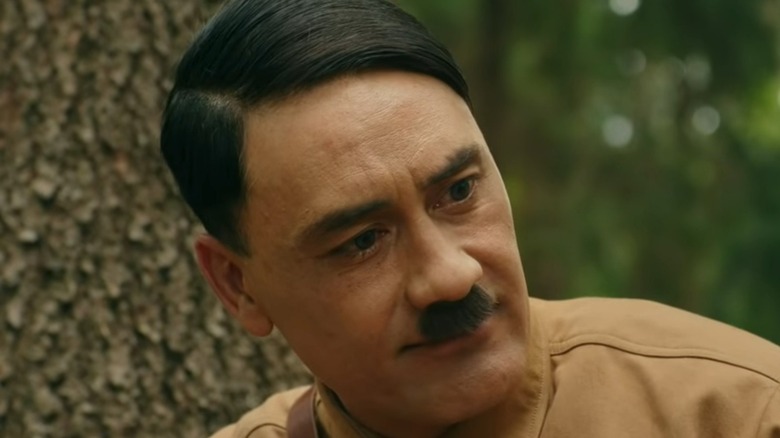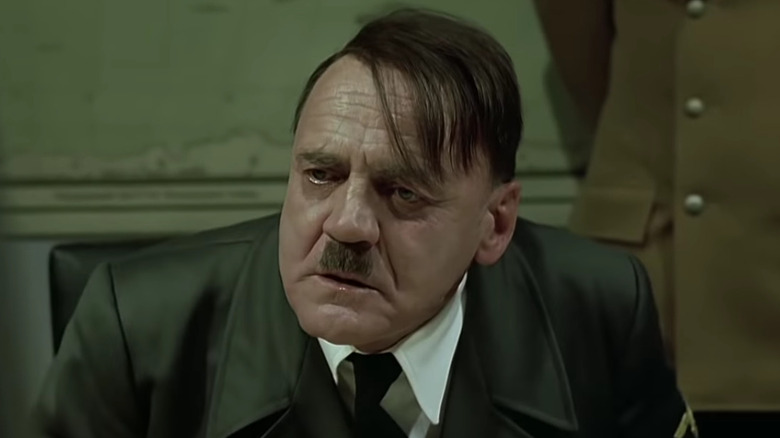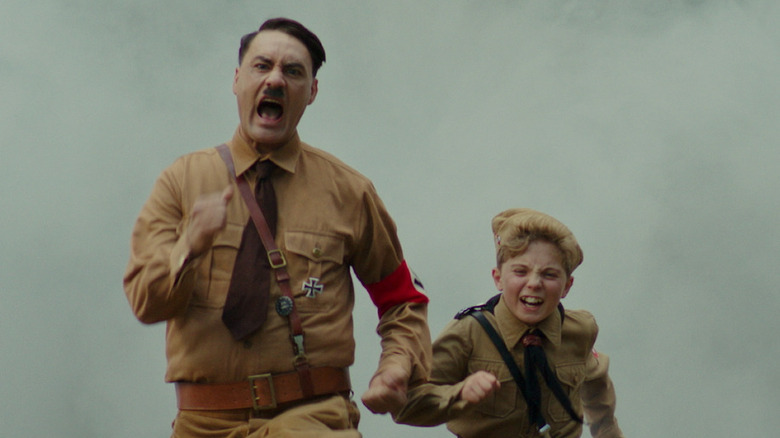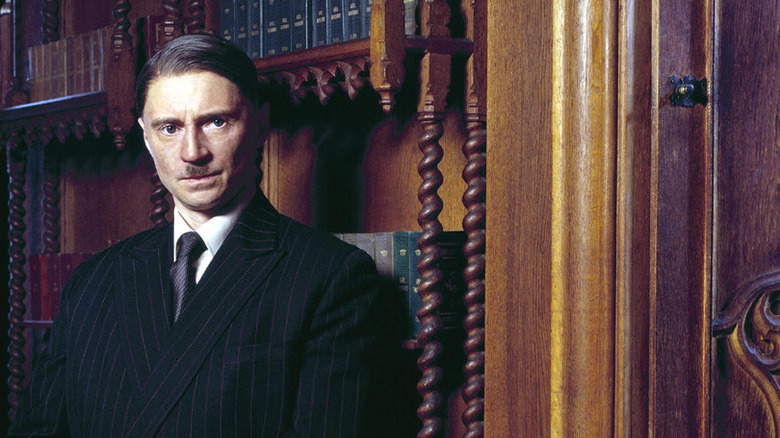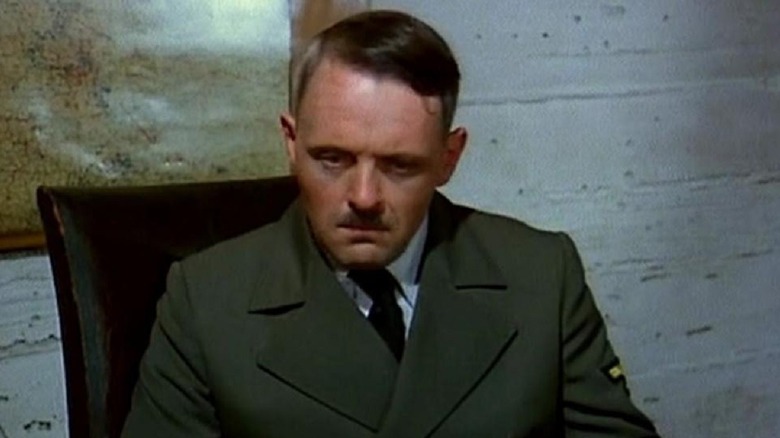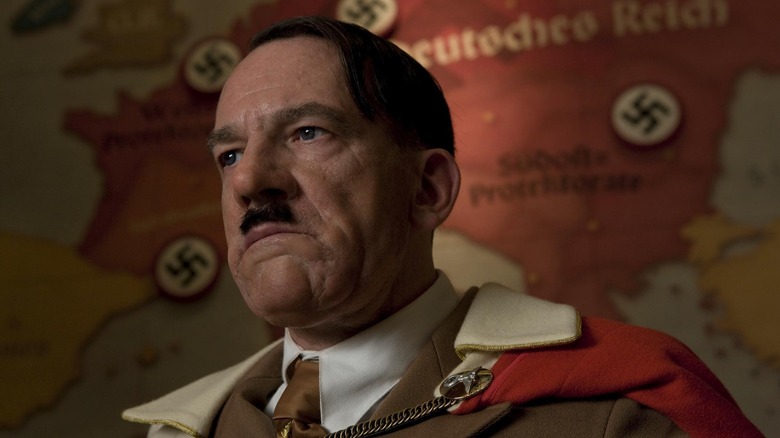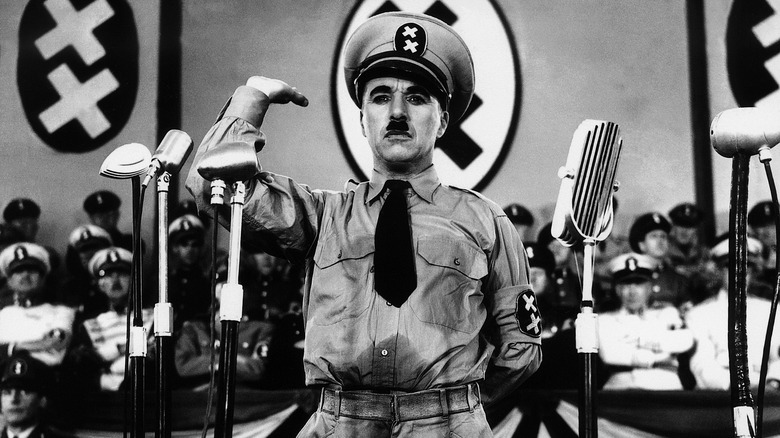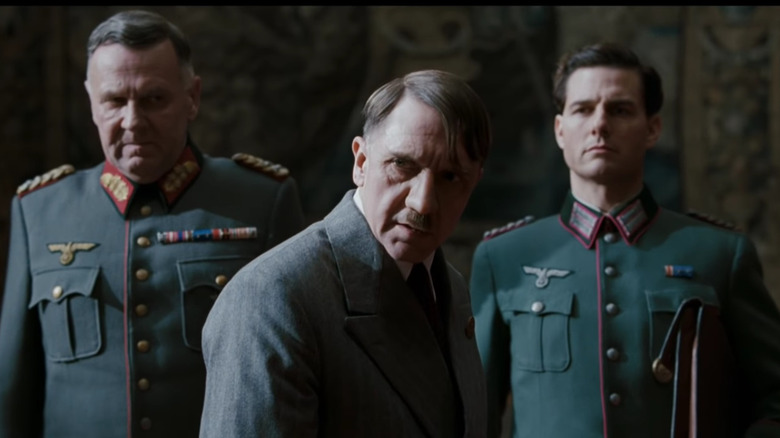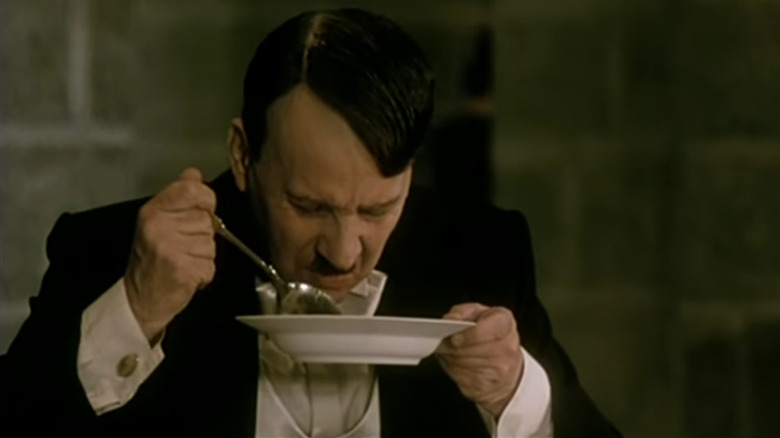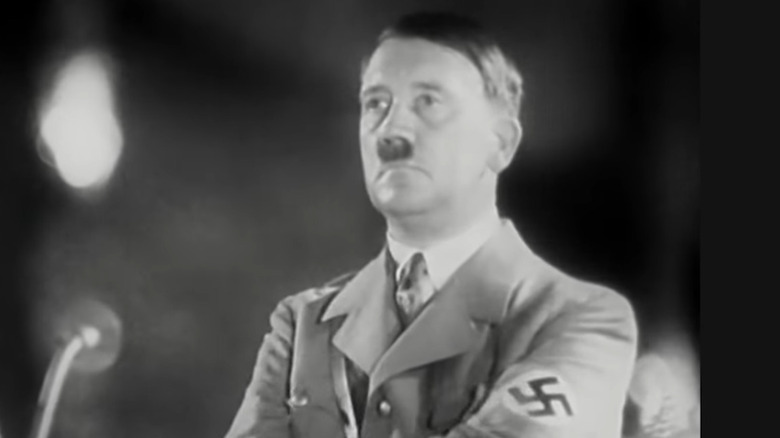10 Movies About Hitler History Buffs Should Watch
Considering the abundance of books that have been written about Adolf Hitler, there have been relatively few films about the Nazi dictator whose calling cards were war and genocide. As a world-historical figure whose name and face are perhaps more synonymous with evil than any other individual, the subject of Hitler is a tough proposition for filmmakers to tackle. If a director focuses on his quirks of character and ridicules his egomaniacal behavior, they lead themselves open to charges of downplaying the horror perpetrated in his name. At the same time, a more detailed and nuanced study of the character of Hitler can lead to accusations of having sympathy for the devil. It's a tricky tightrope to walk.
Nearly 80 years after his death in a Berlin bunker, Hitler's image, name, and deeds have rendered him more of a supernatural monster than a human being to the modern mind. His insatiable lust for power and all-consuming hate irrevocably changed the face of the 20th century, and he continues to cast a shadow over the world. As David Welch of the University of Kent at Canterbury notes, Hitler's architect Albert Speer described him as an "inexplicable demonic figure" — a rare historical occurence that happens from time to time.
Such grand statements serve to add to the mythology of a man who could equally be described as an opportunistic chancer full of venom and spite. Thankfully, the medium of film has not shirked in its duty to document, mock, and understand an all-too-human evil. Here are 10 of the best movies that go straight to the dark heart of Hitler.
Downfall (2004)
The tale of a cunning statesman who hypnotized a nation and ended his days as a paranoid and twitching wreck hiding in a hole would be a tragedy if Adolf Hitler wasn't such a vile figure. Director Oliver Hirschbiegel's "Downfall" documents the dictator's final miserable days in a Berlin bunker. With the war all but lost and the Russians closing in, Hitler continues to rage against a world he believes has betrayed him. He routinely savages his generals just for the sake of it, and Bruno Ganz does a superb job of capturing the fury, resentment, and discontent that is seemingly Hitler's default setting. Stalking around the bunker with a brooding and simmering menace, it doesn't take much for the Fuhrer to erupt in a full-throttle outburst. Such scenes have been famously parodied by many a YouTube video, as CBS reports.
Hitler's rage in the movie can be comical when taken out of the context of the film, but "Downfall" is very much an authentic depiction of the self-defeating and harrowing emptiness at the core of the Third Reich. By depicting Hitler as a frail, petty, and snarling rat caught in a trap of his own making, it poises the unnerving question: How could such an unhinged and empty shell of a man drag a civilized and cultured country into the abyss? There was a widespread concern, particularly in Germany, that "Downfall" was humanizing Hitler, notes the New York Times. Yet, the strength of the film is that it refuses to gloss over the fact that Hitler was a monster with a human heart and a human face. Sadly, his particular brand of evil was far from unique.
Look Who's Back (2014)
In the period between World Wars I and II, Germany was in bad shape, and conditions were ripe for a man whose oratory skills could cynically exploit and manipulate the prejudice and fear of crowds with surgical skill. Adolf Hitler's rise from a homeless and obscure artist to the leader of a country wouldn't have been possible without his way with words and instinctive flair for rousing the rabble, Live Science notes. However, happenstance also gifted Hitler the opportunity for power he so desperately craved. Director David Wnendt's "Look Who's Back" is based on the satirical novel by Timur Vermes and asks the question: How would the modern world receive Hitler? Waking up from a coma in a park that has grown around his former bunker, a disoriented Hitler (Oliver Masucci) finds himself in the year 2014, and he doesn't like what has happened to his country.
Germany, on the other hand, believing Hitler to be a cutting-edge comedian who looks like their former dictator, welcomes him with open arms. Hitler subsequently forges a career for himself in TV whilst attempting to carve a name for himself in politics. The film's strength lies in that it makes the viewer laugh at the absurd and clown-like nature of Hitler when taken out of his historical context. Yet, that laughter soon sticks in the throat when you realize that as Hitler walks around Germany and meets people he begins to garner support for his message. As Wnendt explained to The Guardian, "Our idea was to find out how people react to Hitler today and to ask does he have a chance nowadays."
Jojo Rabbit (2019)
During the era of the Third Reich, the whole of Germany was fed a steady diet of Adolf Hitler, morning, noon, and night. The man with the peculiar haircut, unnerving mustache, wild eyes, and shouty voice was portrayed as a kindly father to the nation, notes Smithsonian Magazine. In director Taika Waititi's "Jojo Rabbit," Roman Griffin Davis plays 10-year-old Hitler Youth member Johannes "Jojo" Betzler. Jojo has an imaginary friend called Adolf that looks, sounds, acts, and for all intents and purposes, is Hitler. The youngster looks to Adolf for guidance and tips on how to navigate the trials and tribulations of growing up. Naturally keen to indoctrinate an innocent with his warped vision and poisonous philosophies, Adolf imparts to Jojo important life lessons, like throwing grenades at the legs of those who have wronged you.
When Jojo finds a Jewish girl called Elsa Korr hiding in the attic of his home, he is conflicted. By revealing her whereabouts he would doom his mother, himself, and Elsa to death. So he decides to use the opportunity to uncover her "secrets" and produce a book that will help the general public recognize those of Jewish blood. Slowly, and despite Adolf's admonishments, Jojo begins to fall in love with Elsa and ends up kicking the ranting Hitler out of a window and into oblivion. "Jojo Rabbit" is a rite-of-passage film with a difference. Through the eyes 10-year-old boy it shows how personal experience and shared humanity can overcome blind nationalism, racial intolerance, and the incessant hate preached by such divisive figures as Hitler.
Hitler: The Rise of Evil (2003)
Whereas "Downfall" depicts the last days of a tyrant, Christian Duguay's TV mini-series "Hitler: The Rise of Evil" concerns itself with how Adolf Hitler ascended the hill of power before he fell down the slippery slope of absolute corruption. Played by Robert Carlye with the same sort of wiry violence and psychotic edge he brought to the role of Begbie in "Trainspotting," Hitler is all naked ambition and reptilian charm as he claws and grasps his way to the top. All the key early events are covered, including his temporary blinding during a mustard gas attack in World War I, the failed Berlin putsch, his imprisonment in Landsberg Prison where he wrote "Mein Kampf," his meeting with Joseph Goebbels, and the Reichstag fire. The timeline of events conspires to paint an ugly picture of just how ruthless Hitler was in his bid to seize power.
The Guardian reports that Ewan McGregor was the first choice to play Hitler, but he declined and so Carlyle filled the breach. Stepping into the shoes of the most hated man in history was difficult, and Carlyle explained, "It's a very strange place to go every day. I thought I knew him. Everybody does. But I didn't. Fortunately, there were mountains of material on him." Although Carlyle's Hitler corresponds chillingly to the personality profile the Behavioral Analysis Unit of the FBI (formerly known as the OSS) compiled on him in 1943, the scene where he beats his pet dog has been challenged (via Lawaspect.com). Hitler was never associated with any violence against animals; however, against people, it was an altogether different story.
The Bunker (1981)
Before "Downfall" there was "The Bunker." Based on the book by James O' Donnell and released in 1981 as a TV movie, it's worth watching just to see how an actor of the caliber of Anthony Hopkins plays Adolf Hitler. The film uses flashback techniques to tell the tale of Hitler's last days in the bunker before and during the Battle of Berlin. Although Hopkins's mannerisms and gestures indicate he has spent a long time researching and studying Hitler, his good work is undone by the fact that he talks in a posh English accent, as do most of the cast. At times this makes it feel like you've taken a wrong turn and ended up in an abandoned Monty Python sketch.
There is also perhaps too much emphasis on the relationship between Hitler and his architect Albert Speer (Richard Jordan). However, Hopkins is in fine fettle and carries the film with his portrayal of a man drugged to the eyeballs, veering increasingly out of control, and striving desperately to keep the madness at bay. It's not one of Hopkins' more renowned roles, but it is worth checking out. His portrayal of Hitler perfectly encapsulates Joseph Goebbels' quote in the film, which states, "The masses don't want to be burdened with problems. They desire only one thing: to be led by a great leader. That's what the intellectuals never understood. But I can assure you, Hitler knew it." With a running time of 150 minutes, "The Bunker" is surprisingly fast-paced and engaging, and it captures the dark and suffocating claustrophobia of Hitler's last 100 days in a concise and no-nonsense manner.
Inglourious Basterds (2009)
Adolf Hitler (Martin Wuttke) may only be a supporting character in Quentin Tarantino's "Inglourious Basterds," but much like Freddy Krueger in the "Nightmare on Elm Street" franchise, he's never from the audience's imagination. He looms large in the smug expressions, bullying presence, and sadistic gleefulness of every jack-booted Nazi who goosesteps into the frame. The film asks the question that nearly every one of a certain age on the planet has asked at one time or another, "Why couldn't Hitler have been taken out of action earlier in the war and saved everyone a lot of heartbreak and suffering?" In typical Tarantino fashion, the movie answers that question in a hail of bullets and plenty of choreographed violence.
As head of a Jewish-American outfit of soldiers called the "Basterds,' Lieutenant Aldo Raine (Brad Pitt) takes the fight to the Nazis and plays them at their own game. The film is all about giving Hitler a taste of his own medicine, and as we observe, the Nazis sure as hell don't like it when the boot's on the other foot. By luring Hitler and his chief henchman into a cinema at the end of the film to watch a propaganda film, Tarantino creates an alternate universe where cinema saves the day. As the whole movie house goes up in flames, and Hitler is repeatedly shot by one of the Basterds, Hollywood not only supplies the audience with what it's most renowned for — a happy ending — but Tarantino reminds us that revising history can also be a lot of fun when done right.
The Great Dictator (1940)
There's always been something pathetically humorous about Adolf Hitler. Take away the propaganda, the trappings of state, his control of the army, and the smoke and mirrors mythology he actively built up around himself, and you're left with a ranting and impotent clown. It's no wonder that Charlie Chaplin went for the jugular with such high style in "The Great Dictator." Playing both a Jewish barber and the fascist dictator (Adenoid Hynkel) who persecutes him, the film marked Chaplin's first foray into the world of true sound films. It's a scorching satire on fascism and deftly shows how characters such as Hitler and Mussolini are little more than angry caricatures without any depth or substance.
During filming, World War II had yet to break out, and due to the United Kingdom's appeasement policy with Hitler, it was doubtful if the film would be shown in Britain or the United States (via The BBC). Yet upon its release in 1940, the landscape had changed irrevocably. "The Great Dictator" was banned in Germany and every country under Nazi rule, but in the Allied countries, it was a box office smash. Chaplin loathed the Nazis, and, in turn, he was disparaged by German propaganda. He was also labeled "The 20th-Century Moses" by the U.S. press for financing the escape of thousands of Jewish refugees. Bizarrely, Chaplin and Hitler were born in the same week in April 1889, and both became world-famous for their peculiar facial hair. Yet, that's where all similarities end. Action makes a man, and Chaplin was calling out Hitler and the Nazis before the rest of the world caught on.
Valkyrie (2008)
Adolf Hitler actively encouraged paranoia and backstabbing in his inner circle and was a firm believer in the rule of divide and conquer. When everyone was in perpetual fear of their status in the hierarchy and constantly jockeying for position, Hitler's hegemony was pretty much unassailable. Which makes it even more remarkable that from 1921 until his death on April 30, 1945, there were a total of six assassination attempts on the top Nazi (via History). Starring Tom Cruise as Col. Claus von Stauffenberg, "Valkyrie" tells the tale of a group of German army officers who planned to kill Hitler in 1944. Known as "The July Plot," it was the final attempt on Hitler's life, and like the other five, it was unsuccessful.
The film is well-paced and does a good job of capturing the tension that Stauffenberg and his fellow conspirators must have felt carrying a briefcase full of explosives into the heart of the Wolf's Lair. Although the bomb explodes and kills four men, Hitler escapes unscathed. "Valkyrie" is a timely meditation on the lack of happy endings in real life and the innocence of chance and leaves the viewer wondering what further carnage could have been avoided if fate had intervened to push Hitler off the mortal coil prematurely. As it was, yet another brush with death served as rocket fuel to Hitler's megalomania, and believing himself immortal, he upped the ante until there was nowhere left to hide.
Moloch (1999)
Eva Braun stood by Adolf Hitler's side to the bitter end. Her reward was a marriage in a Berlin bunker followed up with death a few hours later (via History). Braun was known to hold a stabilizing and domesticating influence over Hitler, and their relationship is the subject of director Alexander Sokurov's 1999 film "Moloch." Set a few months before the Battle of Stalingrad, the film imagines how Hitler (Leonid Mozgovoy) and Braun (Yelena Rufanova) would have spent 24 hours in the idyllic and remote Berghof Retreat as Europe burned around them. As Braun dances around the place naked and affectionately refers to Hitler as "Adi," the viewer is reminded poignantly of the complete detachment of dictators from the untold misery they cause.
Hitler spends a large part of his time ranting about anything that takes his fancy and is surrounded by sycophants at every turn. Although towards the end of the film, Braun warns him no one can escape the clutches of the Grim Reaper, it falls on deaf ears to a Hitler who in the spring of 1942 was still intoxicated with recent German victories. Through Braun's attachment to Hitler, the movie attempts to take the monster from mythology and humanize him. She is the only one who dares to contradict the Fuhrer and has his indulgence while others have only his contempt.
Triumph of the Will (1935)
Adolf Hitler's story is inseparable from the story of the 20th century. The evil perpetrated in his name cannot be underestimated. The question of why it happened and why an entire country allowed it to happen has never been satisfactorily answered. However, Leni Riefenstahl's propaganda documentary "Triumph of the Will" comes close. The 1934 Nuremberg rally and Nazi Party congress it captures documents the collective hysteria and national fervor that surrounded Hitler and the Nazis, before their twisted philosophies and dark intent became a reality that ravaged the world. Hitler and his cronies come across like rock stars at a stadium gig. The mass salutes, the zombie-like adulation of the crowd, and the intoxicating abandon of personal responsibility in the face of the collective will are painfully apparent.
Watching "The Triumph of the Will" at the beginning of the 21st Century is like the unfolding of a horror film. The marching, the swastikas, the speeches, the massed conformity, the fetishizing of military structures, and abject worship of institutionalized power are deeply nauseating, especially when you know where this particular road leads. Above all, the self-satisfied seriousness of Hitler as he makes his speeches and pompously parades around the place like a statesman delivered from on high makes you want to scream at the screen, "Guess what sucker, in the end, you lose, and badly!"
